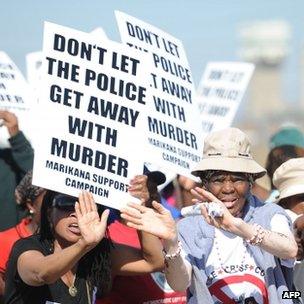Marikana mine shootings: South African inquiry delayed
- Published

People protested as the head of the commission visited the scene of the shootings
A South African inquiry into the deaths of 44 people, including 34 miners shot dead by police, has been delayed to let lawyers consult the clients.
A lawyer for some families said not all of the dead had been buried and so he had not been able to speak to those relatives.
Commissioners have already visited the scene of the killings near the Lonmin-owned platinum mine in Marikana.
Crime scene investigators and forensic experts are also expected to testify.
The BBC's Milton Nkosi says that the families of only five of the 34 miners who were shot by police had made it to Marikana mine death probe delayedthe hearing in Rustenburg, near the scene of the shooting and 100km (60 miles) north-west of Johannesburg.
Lawyer Dumisa Ntsebeza said the other families were not expected to reach the town until Monday and said the government should organise their transport.
"While expedition is important, there should be a level of sensitivity," he said, according to the AFP news agency.
"It can't be correct that we inquire into the dead and their families are not here."
The final funeral for those killed is due to take place this weekend, across the country in Eastern Cape province, where many of the miners come from.
In all, 270 miners have been charged with the murder of their own colleagues under an apartheid-era "common purpose doctrine" law.
Their lawyer Dali Mpofu said it would take a month to interview all his clients, even if he spent an hour with each of them.
He warned that "haste may result in us having a half-baked and rushed product".
Retired Supreme Court of Appeal Judge Ian Farlam, who is leading the commission of inquiry, said it would resume on 22 October.
In addition to the 34 miners killed, the three-member panel will also consider the deaths of 10 others, including two policemen, who died during weeks of unrest at the mine.
The day of bloodshed on 16 August was the most deadly police action in South Africa since the end of apartheid (white minority rule) in 1994.
It was sparked by a stand-off between miners and mine owners over pay.
The judicial commission of inquiry was set up by President Jacob Zuma soon after the shootings.
The investigation will determine the roles played by the police, the management of the platinum mine, Lonmin, the unions and government.
The commission is expected to complete its analysis within four months. It must submit its final report within a month of finishing its investigation.
A total of 46 people died in the violent protests which took place during weeks of unrest at the platinum mine. However, only 44 deaths are being investigated as two deaths fall outside the scope of the inquiry.
Late last month, striking miners at the Marikana mine agreed to return to work after accepting a large pay rise.
But the strikes and unrest have spread to other mines in South Africa, one of the world's biggest producers of precious metals.
On Tuesday, one of the country's leading gold mines, Gold Fields, evicted 5,000 striking employees from company dormitories, saying they were intimidating fellow workers.
- Published20 September 2012
- Published12 September 2012
- Published18 September 2012
- Published8 September 2012
- Published13 September 2012
- Published24 August 2012
- Published23 August 2012